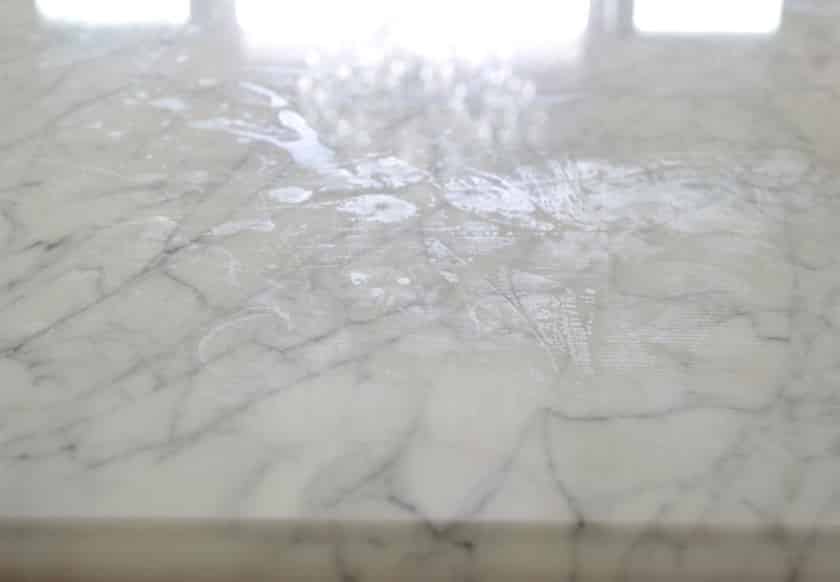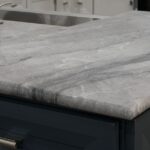
For all its beauty and unmatched glamour, marble countertops do tend to accumulate stains and etch marks over time. So, our main concern in this article is to answer the question: how to remove stains and etches from marble countertops?
Those stains and etches happens because marble, being porous and sensitive to acid, is very quick to soak in liquids and react to them. Luckily that doesn’t have to be the end. It’s perfectly possible to remove stains and etches from marble countertops, and you will learn how to do it in this article.
Understanding stains and etches on Marble
Both stains and etches are undesirable on marble countertops and a consequence of liquid spills. However, their nature and appearance are quite different.
Stains are the consequence of colored liquids being soaked up into the stone.
On the other hand, Etches are the consequence of acids coming into touch with marble triggering a reaction with the calcium carbonate found on the stone structure. Some of the material will actually be consumed by this reaction and that will lead to a dull spot, commonly called etch, or etch mark.
Avoiding the occurrence of these marks is a matter of taking care of your marble countertops and cleaning them properly. A subject we have exhausted on our complete guide: “How To Clean Marble Countertops”
Even so, kitchens are always full of liquids prone to stain and etch marble such as fruit juices, wine, coffee, tea, water, vinegar, vegetable, and olive oils, ketchup, bbq sauce, etc., and that makes it really hard to avoid stains and etches forever.
Thankfully, it’s possible to restore your countertops to their state of perfection, especially, if the stain or etch is dealt with sooner rather than later. Once you know how to remove stains and etches from marble countertops, you will be able to handle those issues as they come up.
Removing stains from marble countertops
Plenty of different materials might be responsible for staining your beautiful marble countertops. Thus, the procedure to remove those stains will be slightly different depending on that.
With that said, you should try to identify the perpetrator and use our recommended procedure for it.
Oil-Based Stains
These stains tend to darken the stone’s surface and be very hard to remove since oils don’t evaporate easily.
An oil-based stain might be caused by grease, cooking oil, milk, peanut butter, creams, cosmetics, and so on. And the only way to remove it is by drawing out the oil from the marble countertop.
Clean the area with a soft liquid cleanser mixed with drops of ammonia or acetone. If that doesn’t work, applying a special poultice for a few days might do trick. We will dedicate an entire section of this post to teaching you how to do that.
Organic Stains
These stains originate from coffee, tea, wine, foods, and other organics, they are pink to brown and definitely easier to remove than oil-based stains.
Spot clean the stained area with 12% hydrogen peroxide mixed with a few drops of ammonia. Be careful not to discolor darker stones, hydrogen peroxide is powerful enough for that. After finishing rinse the area and dry it completely.
Again, if this spot cleaning does not do the trick, it’s possible that a poultice application can do it. More on that later on.
Biological Stains
You should opt to fight mold and mildew with specially designed marble mold removers. That’s your safest choice. However, if the product turns out not to be strong, we recommend that you call in stone pros.
Some websites suggest applying a solution that contains bleach, however, if you do that, you’re in for a huge chance of causing etching to the area. It’s best to let professionals take care of your issue and preserve your investment.
Ink and Paint Stains
Ink stains (from markers and pens) or even paint stains can be removed using hydrogen peroxide or lacquer thinner. While the former is better for whiter stones, the latter is better for darker stones. Again, these are strong chemicals, so use them in spots and take care not to discolor your marble countertops.
If the paint stain is superficial, you can try scraping it off with a razor blade. If everything else fails you should also try the poultice application.
Rust Stains
Rust stains are easy to identify they are colored like copper and tend to present themselves in the form of the metallic items that were on top of your marble countertop until you noticed they were staining it.
Sadly, these stains are very hard to remove, they may be permanent. Your best choice is to try the poultice solution.
Water Spots and Rings
Hard water may leave spots or rings on your marble countertop. Those are usually quite superficial and can be removed if you buff the countertop with dry #0000 steel wool.
This technique can also erase light scratches but you should be very careful.
Removing resilient stains with poultice
When the stain has sunk in deep enough just applying products to the surface of the marble won’t be enough to suck it out. However, using an appropriate poultice and leaving it there for a few days might do the trick.
The poultice is prepared by mixing water, baking soda, and a liquid solvent that’s appropriate to the type of stain you’re dealing with. Your goal is to make it the same consistency as peanut butter. See below a table of which liquid solvent to mix to remove the types of stain we discussed.
| Type of Stain | Liquid Solvent |
| Rust Stains | Rust Remover Liquid |
| Oil-Based Stains | Acetone |
| Organic Stains | 6% Hydrogen Peroxide |
| Ink or Paint Stains | 6% Hydrogen Peroxide |
Apply the poultice to the stained area forming a ¼ to ½ inch thick coating. Extend this coating beyond the stained area by at least 1 inch. Cover it with plastic and tape it for sealing.
After 24 hours, remove the plastic and let the poultice dry for another 24 hours. The drying process is what pulls the stain out of the stone and into the material.
Then, remove the poultice, rinse it with water, and buff dry with a soft cloth. Check how it affected the stain, it might take up to 5 applications to remove it thoroughly.
For detailed instructions check out this video from the Marble Institute of America (now, The Natural Stone Institute)
Removing etches from marble countertops
Etch marks, unfortunately, are permanent in a way. However, if they are superficial enough, you can manually polish down the surface and “erase” the etching mark. We will teach you how, and the best is, you can try the same technique for scratches.
You will need to have some marble polishing powder (MB 11 is the standard choice) and a spray bottle. Also, it is definitely recommended that you use latex or rubber gloves to do it. Follow this procedure:
Clean the surface above the etch mark. Add enough polishing powder to cover the entire mark. Spray water on the powder 2 to 3 times. Use a dampened towel to rub the mixture on the etching mark for 20 seconds to 1 minute.
That’s it, if it doesn’t completely remove the mark, you can always try a second time, but only after completely cleaning and drying the countertop. If everything goes right your eches will disappear like magic.
Complete Marble Countertop Restoration
If your stains and etches are too deep for these techniques, don’t fret, cause that’s not the end.
You can hire professionals to hard polish your whole countertop, making it look new again, only a bit thinner.
If you live in Sarasota, FL, or surrounding cities, our team on Eagle Stones is eager to help you. Get in touch or visit our showroom.
FAQ
You can remove water rings from marble by using mild dish soap with water. Start by scrubbing gently with a soft-bristled brush. If the stain resists, buff the surface with a piece of dry super-fine grade (0000) steel wool.
Mild soap and water are the best things you can use on marble. Avoid any acidic products at all costs. Lemon and vinegar and any other cleaning products that may contain acid should never come close to marble.
Baking soda should be used with caution due to its alkaline nature. Using it every day on marble can make your countertop dull.
Restoration is possible by using a soft cloth and a paste made of water and some marble polishing powder. Just be sure to choose a product that is not acidic.



